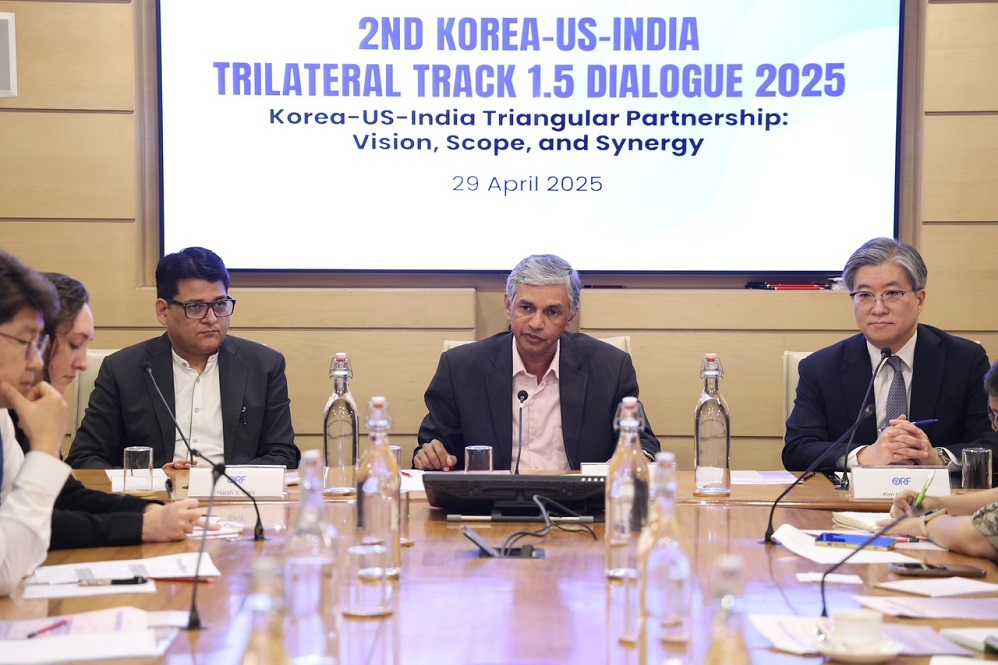The 2nd Korea-India-U.S. 1.5 Track Dialogue (Apr 29)
- DATE
- 2025-04-29
On April 29 (Tuesday), the Embassy of the Republic of Korea in India, in collaboration with India’s think tank ORF (Observer Research Foundation), hosted the 2nd Korea-India-U.S. 1.5 Track Dialogue under the theme, “Korea-India-U.S. Triangular Partnership: Vision, Scope, and Synergy.”
Chaired by Professor Harsh V Pant, Vice President of ORF, the inaugural session saw two addresses by Mr. Kim Hee-sang, Deputy Minister for Economic Affairs of the Ministry of Foreign Affairs of the Republic of Korea, and Mr. Periasamy Kumaran, Secretary East at the Ministry of External Affairs of India.
In his opening remarks, Deputy Minister Kim emphasized that in the current environment where global dynamics are highly sensitive to the political situations of major countries, it is inevitable for Korea, India, and the United States to engage in trilateral cooperation, particularly in areas such as supply chains and critical and emerging technologies. He highlighted that a shared vision for a free, peaceful, and prosperous Indo-Pacific, combined with the complementary strengths of the three countries, makes such cooperation essential. He further underlined that amidst growing uncertainties in the international order, cooperation among trusted partners is not only rare but also essential for strategic cooperation. Marking the 10th anniversary of the Korea-India Special Strategic Partnership, he expressed confidence that the Korea-India-U.S. trilateral cooperation would provide fresh momentum to both bilateral ties and regional collaboration.
In the keynote speech that followed, Secretary Kumaran stressed that Korea-India-U.S. cooperation is crucial for building resilience in the Indo-Pacific region and preparing for emerging risks. He underscored the importance of advancing a free, open, and inclusive Indo-Pacific based on mutual strust among the three countries. He further highlighted the shared values and complementarities among Korea, India, and the U.S., calling for greater collaboration in diverse fields such as critical minerals, supply chain resilience, shipbuilding, disaster relief, critical and emerging technologies, and counter-terrorism.
During the first session titled “Strengthening Cooperation in the Indo-Pacific: Enhancing Opportunities for Strategic Partnership for Korea-India-US Trailateral,” participants reviewed the recent changes in the Indo-Pacific order that facilitate trilateral cooperation and agreed that the shared geopolitical interests and complementarities among the three countries underpin the sustainability of their collaboration.
In the second session on “Synergising Trilateral Collaboration on Supply Chain Resillience, Economic, and Energy Security,” participants assessed opportunities and challenges in economic and energy security cooperation since the beginning of the second Trump administration. They discussed the necessity and prospects for cooperation in areas such as green hydrogen, critical minerals, semiconductors, supply chain diversification, and small modular reactors (SMRs).
The third session on “Expanding Strategic Partnership across New Domains: Maritime Security, Connectivity, and Shipbuilding,” reaffirmed that peace and stability in the Indo-Pacific serve the core interests of all three nations and discussed ways to institutionalize trilateral cooperation in maritime domain awareness (MDA), disaster response, shipbuilding, and enhancing maritime connectivity.
Following the first dialogue held in Seoul in November last year (November 26), this second meeting, convened just five months later, served as an important opportunity to strengthen the network among government officials and scholars committed to advancing Korea-India-U.S. cooperation and to further solidify the consensus for trilateral collaboration.



